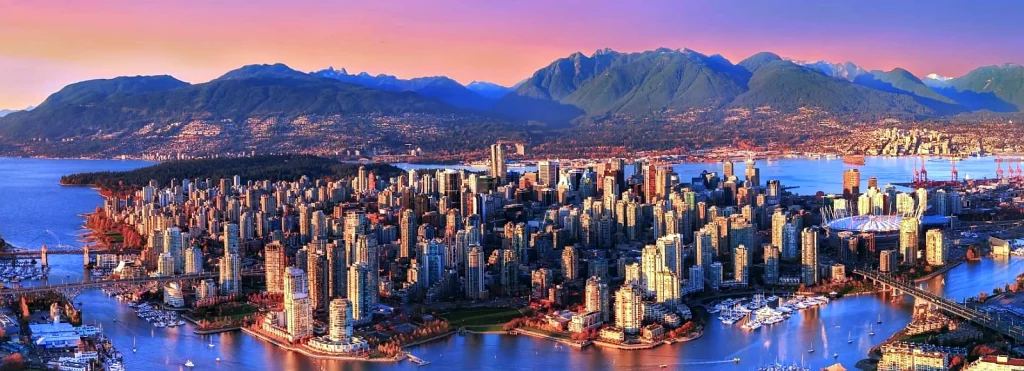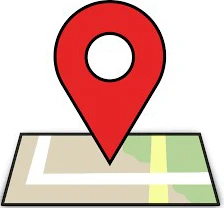Vancouver is one of the most beautiful cities in the world. You’ll find stunning coastal mountains, glass towers, and copper-topped skyscrapers. The area was first claimed by Captain James Cook when he set foot in Canada’s Nootka Sound at Vancouver Island back in 1778, and it has been inhabited by First Nations people ever since. Established after a fire destroyed the fledgling city of Granville in 1886, Vancouver offers some archeological sights such as Stanley Park, Gastown, Underground City District, Railway Docks District, Creekside, and Venables Street. In an hour or less, you can take a ferry and visit Vancouver Island’s famous Pacific Rim National Park to experience more natural surroundings.
The city of Vancouver, which was incorporated in 1886, has a current population of 631,486 (2016) and is the third-largest census metropolitan area in Canada. The city lies on a peninsula in southwest British Columbia and has two extensive waterways that provide transportation to the Pacific Ocean.

What to see and expect:
- Breathtaking mountain and coastal scenery
- Colorful Granville Island in Vancouver
- Victoria – a timeless gem
- Whale watching in the Pacific Rim National Park
Vancouver has many absolutely gorgeous areas and a lively downtown that never sleeps. The heart of the city is Robson Square, surrounded by beautiful architecture and ocean views. You’ll also find vibrant communities in Gastown and Chinatown, the perfect addition to any excursion.
Vancouver is the largest city in British Columbia, Canada. It’s located on the south shore of the beautiful Burrard Inlet. The mild climate, excellent cultural facilities, and natural beauty make Vancouver one of the world’s most livable cities.
Every study to find the world’s most “liveable” city has ranked Vancouver among the best in recent decades. Several factors have shaped its flattering status as the capital of British Columbia.
The most apparent scenic setting is surrounded by Grouse, Cypress, and Seymour Mountains to the north (only 20 minutes by car from the city) and the Pacific Ocean to the West, whose waves, tamed by the magnificent Vancouver Island, lap the city’s shores. The ocean joins the False and Fraser Rivers to create a body of water in which Vancouver’s suburbs evoke a charming island landscape. One of these is Stanley Park, Canada’s largest urban park, with 400 hectares of beech, maple, and pine. As for the climate, temperatures rarely dip below freezing, even in winter, and summers are like a long, pleasant springs.
Google maps Vancouver
The only downside of the area is that it rains a lot. But you can’t have it all at once – and Vancouver is, after all, in the land of icy Canada. It’s no coincidence that Vancouverites spend the most on outdoor activities and sports equipment in Canada, just as it’s no coincidence that Vancouver has the fastest population growth in North America. Given its entertainment, its booming economy (Vancouver is the most important port for Asia-Pacific trade), and its cosmopolitan atmosphere (its nickname, “Hongcouver”, refers to the fact that it has the largest Chinese community after San Francisco), it is natural that so many people have chosen to make it their home.
The conurbation has 18 administrative units and a population of 2 150 000 inhabitants. Of these, 568 000 people live in the original urban area at the western end of the Burrard peninsula. Of these people, 25% are in the 25-45 age group. In short, Vancouver is a young city founded only 100 years ago. To celebrate its centenary, it hosted the 1986 World’s Fair. This event added buildings such as the Canada Market and the geodesic dome of Science World. The city’s magnificent skyline is adorned with more than 700 high-rises – far more than New York City. After all, an apartment with an ocean or mountain view only makes city life more desirable.
Vancouver’s buildings, despite their size, do not spoil the landscape and, amazingly, add to its charm. From the opening of the BC Electric Building in 1957, with its pots and pans evoking the ocean’s blue, the green of the forest, and the black of winter clouds, dozens of architects have worked to forge a dialogue between modernity and nature. Among the most compelling examples of this school are the Central Library, the University of British Columbia’s Museum of Anthropology, and the Law Courts, all designed by the renowned Canadian Arthur Erickson, born in 1924, a pioneer in the revival of Canadian modernism, known for his unique ability to master large-scale contemporary architecture that is sensitive to its site by exploiting the effects of different materials and structures.
Geography
Vancouver is located North of Burrard Inlet and South of the Fraser River, with the Strait of Georgia to the West. Atlantica is to its Eastern side, with Vancouver being in the Pacific time zone and within the Pacific Maritime Ecozone.
In 1885, Vancouver changed its name from “Vancouver Island” to the current “City of Vancouver”. However, people still mistakenly believe that the city is on Vancouver Island.
Vancouver has one of the largest urban parks in North America. Stanley Park covers 1000 acres and can provide scenic views, including Mount Baker in Washington, Vancouver Island, and Bowen Island.
Climate
Vancouver is one of Canada’s warmest cities in the winter. Climate-wise, Vancouver is characterized by an oceanic or marine west coast climate, which borders on a warm-summer Mediterranean climate (Csb). Winter periods are significantly warmer and dryer than summer periods. On average, less than 5 days during July and August result in precipitation, while 60% of days from November through March record some precipitation.
By the numbers, in 2018, Vancouver’s annual rainfall was about 1,190 mm. However, there’s a correlation between where you are and how much rain falls in your area. The rainiest area is Richmond, with an average of around 1,558 mm a year; in contrast, downtown has an average of only 872 mm yearly.
The highest temperature ever recorded at the airport is 34.4 °C (93.9 °F), and the coldest temperature is -17.8 °C (0.0 °F).
Snow typically falls on 3 days per year, with 2 of those days receiving more than 5 cm of snow. The average yearly snowfall is 38.1 cm (15.0 in); however, it usually melts immediately.
Winters in Greater Vancouver are the fourth-mildest of Canadian cities after nearby Victoria, Nanaimo, and Duncan, all on Vancouver Island. Vancouver’s growing season averages 237 days, from March 18 until November 10.
Did you know?
Canada’s culture is shaped by its European (British, French, and Irish) immigrants, who brought their customs when they immigrated. Waves of immigrants from Asia, Africa, and the Caribbean have contributed to the change in the country’s culture. This is why Vancouver celebrates the Chinese new year. Vancouver is a great place to learn English. With over one million Canadians, you’re sure to develop your English skills. Vancouver has a uniquely Canadian culture with its twists, so it’s the perfect place for any learner-Canadian or not.
- Canada is one of the most beautiful countries in the world. People say it has a sense of social responsibility that’s hard to find elsewhere. Canada also has impressive natural features, like its rugged coasts and idyllic islands. It’s bordered by three of the world’s largest countries – the United States to its south, Russia to its east, and China across the Pacific Ocean to its West.
- Vancouver was named after the British explorer George Vancouver (1757 – 1798).
- There is also a significant Aboriginal community in and around Vancouver (the largest in British Columbia).
- Vancouver has more parks than any other city in the world, and one of them is Stanley Park which takes up half of downtown.
- Vancouver is also known as the “city of neighborhoods”: each neighborhood has its own distinct identity (and ethnic make-up).
- The city was first populated in the 1860s due to immigration from the Fraser Canyon Gold Rush, mainly from the United States.
- The city seems much more prominent because of the compact urban core and the vegetation, but it doesn’t take much time to discover an oasis in the urban hustle. One of Vancouver’s most popular spots is the seawall that extends over 22 kilometers long around Stanley Park.
- Vancouver is an important port city in the southwestern part of the province of British Columbia in western Canada, between the Strait of Georgia, the Fraser River, and the Canadian Coast Range. Its proximity to the Pacific Ocean, steep mountains, and fertile valleys make it a wonderful place to visit.
- Vancouver, Canada, where you can visit places like the Vancouver Aquarium, which shows things like dolphins, and the Museum for Anthropology is a place for historical art and contemporary Native Art that you should visit.
- Vancouver, Canada, is a popular tourist destination, with more than 2.5 million people taking a yearly trip there. Vancouver offers a beautiful combination of active outdoor living and proximity to some of the world’s best skiing, snowboarding and bike trails.
- The city of Vancouver has the 4th largest cruise ship terminal globally.
- Home to Canada’s longest pool, with a length of 137.5 meters, it is nearly the size of three Olympic pools. This pool is open year-round and has beautiful scenery, making it a must-see attraction.
- Vancouver’s detached homes are the most expensive in Canada, with an average price of $1,204,587, comparable to New York and London.
- Greenpeace was founded in Vancouver one of the world’s oldest and most successful environmental groups.
- The climate in Vancouver is relatively mild; on average, it receives 1,589mm of rain annually.
Accommodation in Vancouver
There is no shortage of accommodation options in Vancouver. From high-end hotels to more affordable options, there’s something for everyone. If you’re looking for a luxurious stay, the Fairmont Pacific Rim or the Shangri-La Hotel are both excellent choices. If you’re on a budget, there are plenty of great hotels in Vancouver that won’t break the bank. The Hampton Inn & Suites Vancouver Downtown and the Holiday Inn Vancouver Centre are both great options. No matter what your budget is, you’ll be able to find a great place to stay in Vancouver.
Further readings: Vancouver Wikipedia, Canada driving directions.
